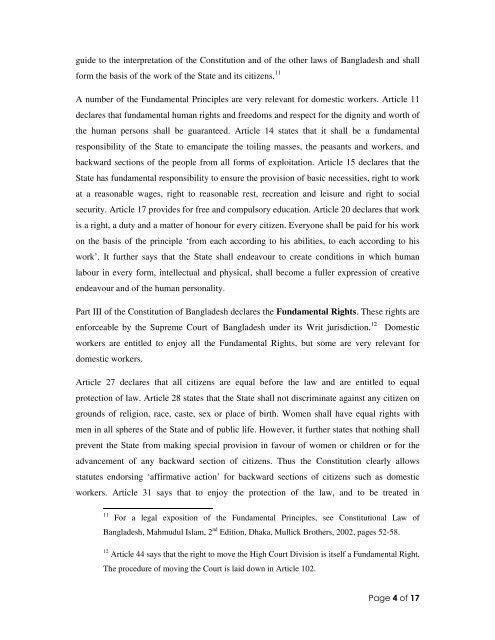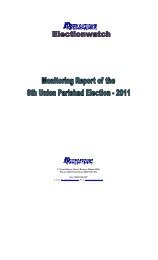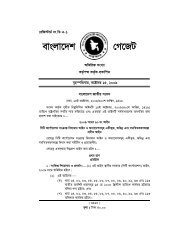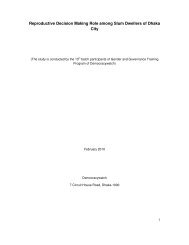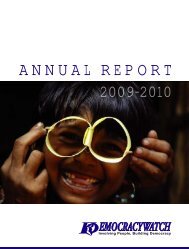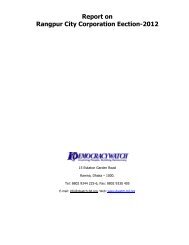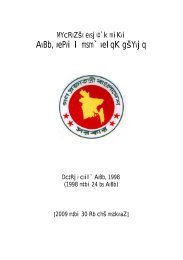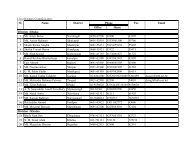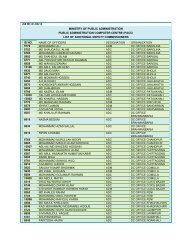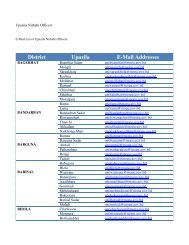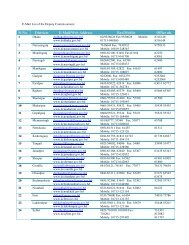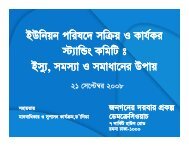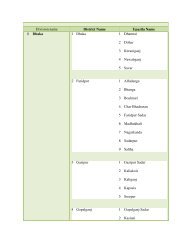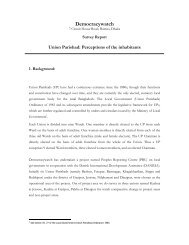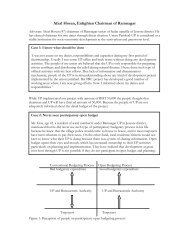Safeguarding the rights of domestic workers: Existing laws and ways ...
Safeguarding the rights of domestic workers: Existing laws and ways ...
Safeguarding the rights of domestic workers: Existing laws and ways ...
You also want an ePaper? Increase the reach of your titles
YUMPU automatically turns print PDFs into web optimized ePapers that Google loves.
guide to <strong>the</strong> interpretation <strong>of</strong> <strong>the</strong> Constitution <strong>and</strong> <strong>of</strong> <strong>the</strong> o<strong>the</strong>r <strong>laws</strong> <strong>of</strong> Bangladesh <strong>and</strong> shall<br />
form <strong>the</strong> basis <strong>of</strong> <strong>the</strong> work <strong>of</strong> <strong>the</strong> State <strong>and</strong> its citizens. 11<br />
A number <strong>of</strong> <strong>the</strong> Fundamental Principles are very relevant for <strong>domestic</strong> <strong>workers</strong>. Article 11<br />
declares that fundamental human <strong>rights</strong> <strong>and</strong> freedoms <strong>and</strong> respect for <strong>the</strong> dignity <strong>and</strong> worth <strong>of</strong><br />
<strong>the</strong> human persons shall be guaranteed. Article 14 states that it shall be a fundamental<br />
responsibility <strong>of</strong> <strong>the</strong> State to emancipate <strong>the</strong> toiling masses, <strong>the</strong> peasants <strong>and</strong> <strong>workers</strong>, <strong>and</strong><br />
backward sections <strong>of</strong> <strong>the</strong> people from all forms <strong>of</strong> exploitation. Article 15 declares that <strong>the</strong><br />
State has fundamental responsibility to ensure <strong>the</strong> provision <strong>of</strong> basic necessities, right to work<br />
at a reasonable wages, right to reasonable rest, recreation <strong>and</strong> leisure <strong>and</strong> right to social<br />
security. Article 17 provides for free <strong>and</strong> compulsory education. Article 20 declares that work<br />
is a right, a duty <strong>and</strong> a matter <strong>of</strong> honour for every citizen. Everyone shall be paid for his work<br />
on <strong>the</strong> basis <strong>of</strong> <strong>the</strong> principle ‘from each according to his abilities, to each according to his<br />
work’. It fur<strong>the</strong>r says that <strong>the</strong> State shall endeavour to create conditions in which human<br />
labour in every form, intellectual <strong>and</strong> physical, shall become a fuller expression <strong>of</strong> creative<br />
endeavour <strong>and</strong> <strong>of</strong> <strong>the</strong> human personality.<br />
Part III <strong>of</strong> <strong>the</strong> Constitution <strong>of</strong> Bangladesh declares <strong>the</strong> Fundamental Rights. These <strong>rights</strong> are<br />
enforceable by <strong>the</strong> Supreme Court <strong>of</strong> Bangladesh under its Writ jurisdiction. 12<br />
Domestic<br />
<strong>workers</strong> are entitled to enjoy all <strong>the</strong> Fundamental Rights, but some are very relevant for<br />
<strong>domestic</strong> <strong>workers</strong>.<br />
Article 27 declares that all citizens are equal before <strong>the</strong> law <strong>and</strong> are entitled to equal<br />
protection <strong>of</strong> law. Article 28 states that <strong>the</strong> State shall not discriminate against any citizen on<br />
grounds <strong>of</strong> religion, race, caste, sex or place <strong>of</strong> birth. Women shall have equal <strong>rights</strong> with<br />
men in all spheres <strong>of</strong> <strong>the</strong> State <strong>and</strong> <strong>of</strong> public life. However, it fur<strong>the</strong>r states that nothing shall<br />
prevent <strong>the</strong> State from making special provision in favour <strong>of</strong> women or children or for <strong>the</strong><br />
advancement <strong>of</strong> any backward section <strong>of</strong> citizens. Thus <strong>the</strong> Constitution clearly allows<br />
statutes endorsing ‘affirmative action’ for backward sections <strong>of</strong> citizens such as <strong>domestic</strong><br />
<strong>workers</strong>. Article 31 says that to enjoy <strong>the</strong> protection <strong>of</strong> <strong>the</strong> law, <strong>and</strong> to be treated in<br />
<br />
11<br />
For a legal exposition <strong>of</strong> <strong>the</strong> Fundamental Principles, see Constitutional Law <strong>of</strong><br />
Bangladesh, Mahmudul Islam, 2 nd Edition, Dhaka, Mullick Bro<strong>the</strong>rs, 2002, pages 52-58.<br />
12 Article 44 says that <strong>the</strong> right to move <strong>the</strong> High Court Division is itself a Fundamental Right.<br />
The procedure <strong>of</strong> moving <strong>the</strong> Court is laid down in Article 102.


